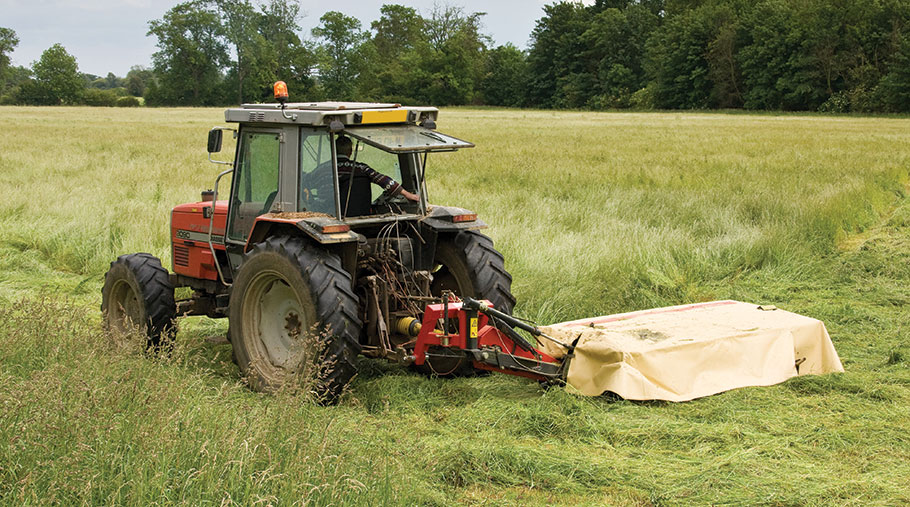How to become a county council farm tenant
 © Tim Scrivener
© Tim Scrivener County council farms provide a great opportunity for people looking to reach the first rung in the farming ladder and many holdings are designed specifically with new entrants in mind.
In England, 2,502 farms covering 87,000ha are let by councils to 2,053 tenants, according to the 67th annual report to parliament on local authority smallholdings, which covers April 2016 to March 2017.
Cambridgeshire’s Farms Estate is the largest in England and Wales, and is made up of 232 tenancies across 13,400ha – giving an average farm size of 57ha.
See also: How the Next Generation network is helping young people get into farming
What’s on offer
Smaller starter units offered by councils are often an appealing alternative to a bigger private tenancy that can require an investment of hundreds of thousands of pounds.
George Dunn, chief executive of Tenant Farmers Association, says most local authorities will be looking for tenants below the age of 40, though tender exercises will be open to individuals of any age.
It is also important for tenants to consider what the plan will be beyond the fixed term being offered by the authority, as the time will tick away quickly.
Some councils do offer long-term agreements, but many are still fixated with short-term plans. Others may offer a short tenancy on a starter farm, with the possibility of a future term on a progression holding.
Tenants should bear in mind the wider context surrounding county farms. As assets of the local authority, the estates need to be run profitably to contribute to other frontline services, so rents may not necessarily be cheap and a strong, viable business plan is essential.
Application advice
Duncan Slade, rural estates surveyor at Norfolk County Farms, is tasked with finding the best potential applicant for any farm on offer.
“We start with preparing the details of the farm and conducting a farm open day so applicants can meet us and view the farm,” he says. “We also run applicant training days where we have a team of experts to offer advice on budgeting, business planning, marketing for example.”
Each applicant has to attend a farm viewing day, complete an application form and submit a detailed business plan for the farm they want to apply for.
The business plan must include a financial summary and forecasts covering the first three years of the proposed business, a management and marketing strategy, a strengths, weaknesses, opportunities and threats analysis, and business aims and objectives.
See also: County council farms – how many are left?
Mr Slade recommends people seek professional advice where appropriate or discuss it with their farming friends and connections.
After the applications have been submitted, now done entirely online, the team uses a scoring matrix to create a shortlist of people to interview.
A panel of experts interviews the candidates and then appoints the successful applicant.
“We are looking for someone who can assure us that they are the best fit for the farm – someone who we can give the keys to the farm to and know that it is in good hands,” says Mr Slade. “We want tenants who are enterprising, adaptable and hardworking.”
Mr Slade’s three top tips:
- Really engage with the process
- The business plan is an essential and critical document so don’t just pay lip service to it
- Consider what the council’s aims and objectives are for holding the county farms estate. How can your business help the county meet those?
Advice for tenancy applications
- Applicants must prove to a landlord they are dedicated to farming and have financial sustainability and sound judgement.
- Have an open mind and do not be limited to one location – be prepared to move.
- On the viewing day, take time to walk around the farm, assess the land and buildings, and get a feel for the place. Dress tidily, be polite and ask questions.
- Give yourself time to prepare the business plan and tender documentation. It will take weeks to prepare a good tender and it may need to be altered before submission.
- Prepare a budget, cashflow and balance sheet to demonstrate the viability of the business, show your assets and display how you would finance taking over the farm.
- Present the information in a clear and logical way; your figures will have to stand up to scrutiny.
- Decide on a level of rent that is sustainable. Do not overestimate the rental value in an attempt to win the farm.
- Before signing a written farm business tenancy agreement, check it contains the terms you expected. It is advisable that you seek advice on this.
- If you don’t succeed on your first attempt, ask for feedback and keep trying.
Case study
Brian and Carla-May Roberts, Coxhill Farm, Burlington Estate, Norfolk
 Earlier this year, Norfolk County Council (NCC) began a search for enthusiastic and hard-working tenants to take on business tenancies at four farms.
Earlier this year, Norfolk County Council (NCC) began a search for enthusiastic and hard-working tenants to take on business tenancies at four farms.
The council received 39 high-standard applications and nine candidates were interviewed by a panel of officers, elected members and external experts. Tenants were found for each farm.
Councillor Keith Kiddie, chairman of NCC’s business and property committee, said: “This year’s lettings illustrate the success of the county farms estate in providing a crucial ladder into farming.
“Two existing tenants are being able to progress to larger farms, and new entrants are being given the chance to get established and farm on their own account.”
New entrants Brian and Carla-May Roberts successfully applied for the tenancy of the 88ha Coxhill Farm on the Burlingham Estate.
Mr Roberts’ great-grandfather and grandfather were both county council farm tenants, which prompted the idea of applying for a council farm tenancy.
Advised to learn a trade, Mr Roberts became a plumbing and heating engineer, but about seven years ago decided to follow his dream of getting into farming.
The couple bought a tractor and started a contracting business, but still wanted to farm full-time.
When they discovered that the county council farm was coming up for tender, they immediately decided to apply.
See also: The benefits of becoming a council farm tenant
After completing a two-day course offered by NCC for first-time applicants, Mr and Mrs Roberts attended the mandatory viewing day and worked on their application, with the professional assistance of a land agent.
“Our goal was to stand out,” says Mr Roberts. “The council gave us the criteria of what they wanted, like business plans, and we tried to go the extra mile and give lots of detail.”
It took three weeks after submitting their application to find out they had made the shortlist for interview.
Then Mr and Mrs Roberts gave a presentation on their proposal and answered questions from six panellists.
“I wanted to show this is the biggest move of our life, it’s life-changing,” said Mr Roberts. “I tried to put across that we are passionate and hard-working and aware we’ll come across hard times.”
Later that day, Mr Roberts received a phone call to say they had been successful and their 10-year tenancy would begin in October.
“It’s difficult to get on the farming ladder so this is a big opportunity, and it’s a privilege to be given it by the council,” says Mr Roberts.
“The hardest thing is sitting and waiting, I just want to get on, hit the ground running and put our mark on it. I can’t wait.”
Alongside a traditional arable rotation, the tenants also hope to start an aquaponics enterprise growing salad leaves.
Mr Roberts advises future applicants to show passion, remember nothing is a substitute for hard work, and use professionals where needed.
